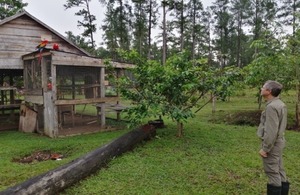UK reaffirms commitment to protect biodiversity and reduce poverty in Honduras: British Ambassador visits La Moskitia
UK funded projects help communities in La Moskitia address trafficking of scarlet and green macaws, whilst providing sustainable livelihoods and protect the environment.

HMA looking at Scarlet Macaws in Honduras
The British Ambassador to Honduras, Nick Whittingham, visited La Moskitia from 2 to 9 May to assess the impact of UK funded projects, which have been implemented in Gracias a Dios Department. The UK Department of Food and Rural Affairs (DEFRA) have provided more than US$700,000 in funds from 2016 to 2021, through projects from the Illegal Wildlife Trade Challenge Fund and the Darwin Initiative (which also covered Nicaragua).
One project aimed to reduce the trafficking of Hondura’s national bird, the scarlet macaw. The initiative strengthened management and law enforcement of indigenous territories. It also improved local livelihoods of approximately 4,200 people across 3,300 km2 of the Honduran Moskitia by providing technical support to 11 indigenous communities, decreasing nest poaching and coordinating enforcement with government agencies.
Ambassador Whittingham travelled to the Mabita Scarlet Macaw Rescue Centre. He saw the results of training community patrollers, who have now the tools to collect data of vulnerable spots where the scarlet macaws are nesting. As a result, nests have been protected and unlawful intrusions spotted, and official complaints filed working with the Honduran Armed Forces and the Environmental Prosecution Office.
Villagers have also benefited from sustainable livelihoods, which helps prevent economic dependence on illegal wildlife trade. For example, the project subscribed conservation agreements with several communities such as Corinto, Wahabisban and Mabita. It provides seeds banks and staple food seeds that are planted. These generate grains for food and selling to local market.
Mr Whittingham travelled to Wampursirpi and Krausirpi to check developments on new initiatives established by a DEFRA funded project. The project aims to improve livestock management and agroforestry techniques implementation on local farms, which will improve economic-environmental stability in the Moskitia. It delivers key technical assistance for sustainable environmentally sound agricultural production techniques. These techniques are now being escalated into more complex agroforestry plots that incorporate cacao as a way to increase indigenous families’ income and reduce deforestation and loss of biodiversity.
Wildlife Conservation Society (WCS) implemented these projects working closely with local and central Honduran authorities. Whilst in La Moskitia, Ambassador Whittingham also visited other projects funded by the World Food Programme (WFP), which took him to visit Sirsitara, Tuburus and Puerto Lempira. The visit reaffirmed the United Kingdom’s interest in continuing to work with Honduras in addressing climate change, conserving global carbon sinks and other critical ecosystems.
Ambassador Whittingham highlighted that the United Kingdom will do this through the Biodiverse Landscapes Fund. This US$20 million initiative will help Guatemala, El Salvador, Honduras and Belize to protect biodiversity, face the impacts of climate change and reduce poverty for 7 years. Implementation of the Fund is expected to start at the end of 2022.